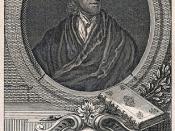When one tries to decide whether Locke was misguided in trying to account for all the legitimate functions of government in terms of "the preservation of property", it is important to qualify the statement by deciding what exactly Locke meant as property in the first place.
Locke states that "every Man has a property in his own Persons", this is a difficult notion to grasp given our own modern definition of property. Our "persons" are certainly not a property in the sense of being something we could see to someone else, and the right to trade away or alienate something is certainly a major part of the modern meaning of the notion of property. However, the word 'property' in the seventeenth century was often used more widely to denote any rights of a fundamental kind, and fundamental rights were often claimed to be inalienable. For Locke therefore, human beings are primarily centres of rights and duties (rather than, as with Hobbes, centres of appetites).
The right and duty or 'property' of humanity requires, first and foremost, our survival. However, Locke is also at pains to state that once "our own Preservation comes not into competition, ought he, as much as he can, to preserve the rest of Mankind." The extent to which I may exercise my political liberty to ensure my own survival therefore, is constrained to the ability to which you may exercise yours. Locke proposes that one must derive our political power as this is the "state of perfect freedom to order their actions and dispose of their possessions and persons as they think fit within the bounds of the law of nature."
There is no doubt, that the society that transpires out of a Lockean government offers individuals some of the qualities that one would expect to...



Excellent
I wanted to say that this essay is extreamly informative and thourough about the topic. I feel that this essay was very well constructed
4 out of 4 people found this comment useful.